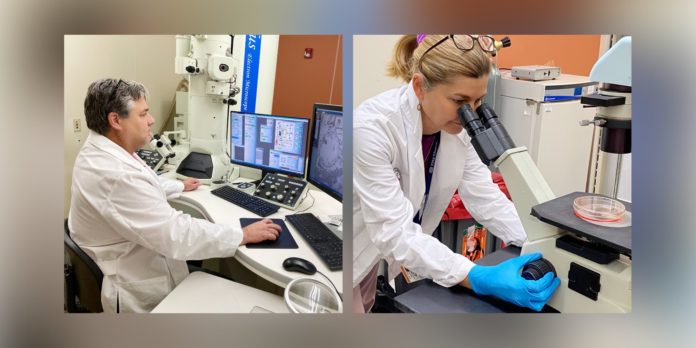SAVANNAH – Mercer University School of Medicine faculty members Dr. Robert Visalli and Melissa Visalli were recently awarded a $407,629 National Institutes of Health (NIH) Research Enhancement Award (R15) to support development of a first-of-its-kind antiviral drug for human herpesvirus.
The grant proposal, titled “Targeting the Structurally Conserved Portal Protein as a Strategy to Develop a First-In-Class Broad-Spectrum Herpesvirus Antiviral Drug, PORT 1,” was funded through the NIH’s National Institute of Allergy and Infectious Diseases (NIAID) as a Research Enhancement Program (REAP) award.
REAP represents one of two types of R15 awards that support projects at professional and graduate schools that have not been major recipients of NIH support in order to stimulate basic and clinical research and contribute to the nation’s biomedical research effort. The goals of R15 awards are to support meritorious research, expose students to research and strengthen the research environment of the institution.
“Although these studies may lead to new broad-spectrum therapeutic options to treat herpesvirus infections, equally important is the opportunity to provide undergraduate, graduate and medical students opportunities to participate in productive research with hands-on mentoring,” said Dr. Visalli. “Melissa and I have a genuine interest in exposing students to quality, impactful research experiences that include professionalism and integrity.”
Dr. Visalli serves as professor of microbiology on the School of Medicine’s Savannah campus. During his more than 30 years of research on human herpesvirus, he has been involved in the development of an attenuated herpes simplex virus vaccine candidate and the discovery of a novel class of thiourea compounds amenable to antiviral chemotherapy.
“There are nine different herpesviruses (Herpes simplex types 1 and 2, Varicella-zoster virus, Epstein-Barr virus, Human Cytomegalovirus, Human herpesvirus types 6a, 6b, 7 and Kaposi’s Sarcoma virus) that cause mild to severe disease in humans. Our laboratory is interested in a series of novel small molecules that prevent infectious viral particles from forming in infected cells,” he said. “The discovery of a broad-spectrum, anti-herpesviral drug with few side effects and a novel mechanism of action would fill an important unmet clinical need.”
His laboratory has provided undergraduate, graduate and medical students research opportunities in molecular herpes virology for the past 17 years. Students have successfully published and presented their results related to herpesvirus DNA encapsidation. Studies have included identification of herpesvirus terminase proteins, portal proteins and characterization of a novel series of small molecule inhibitors that prevent encapsidation in herpesviruses. Dr. Visalli previously received R15 Academic Research Enhancement Awards (AREA) in 2005 and 2010.
He earned his bachelor’s degree in microbiology from Indiana University Bloomington and Ph.D. in medical microbiology and immunology from the University of Wisconsin–Madison and completed postdoctoral training at the Pennsylvania State University School of Medicine Hershey Medical Center.
Melissa Visalli serves as a research associate on the Savannah campus, where she is currently studying the mechanism of viral genome processing and packaging in herpesviruses. She has extensive training and expertise in molecular biology and has mentored many undergraduate and graduate students.
She earned her bachelor’s degree in molecular biology from the University of Wisconsin–Madison and M.S.Ed. in science education from Indiana University Fort Wayne.
About Mercer University School of Medicine (Macon, Savannah and Columbus)
Mercer University’s School of Medicine was established in 1982 to educate physicians and health professionals to meet the primary care and health care needs of rural and medically underserved areas of Georgia. Today, more than 60 percent of graduates currently practice in the state of Georgia, and of those, more than 80 percent are practicing in rural or medically underserved areas of Georgia. Mercer medical students benefit from a problem-based medical education program that provides early patient care experiences. Such an academic environment fosters the early development of clinical problem-solving and instills in each student an awareness of the place of the basic medical sciences in medical practice. The School opened a full four-year campus in Savannah in 2008 at Memorial University Medical Center. In 2012, the School began offering clinical education for third- and fourth-year medical students in Columbus. Following their second year, students participate in core clinical clerkships at the School’s primary teaching hospitals: Medical Center, Navicent Health in Macon; Memorial University Medical Center in Savannah; and Piedmont Columbus Regional Hospital and St. Francis Hospital in Columbus. The School also offers master’s degrees in family therapy, preclinical sciences and biomedical sciences and a Ph.D. in rural health sciences.









